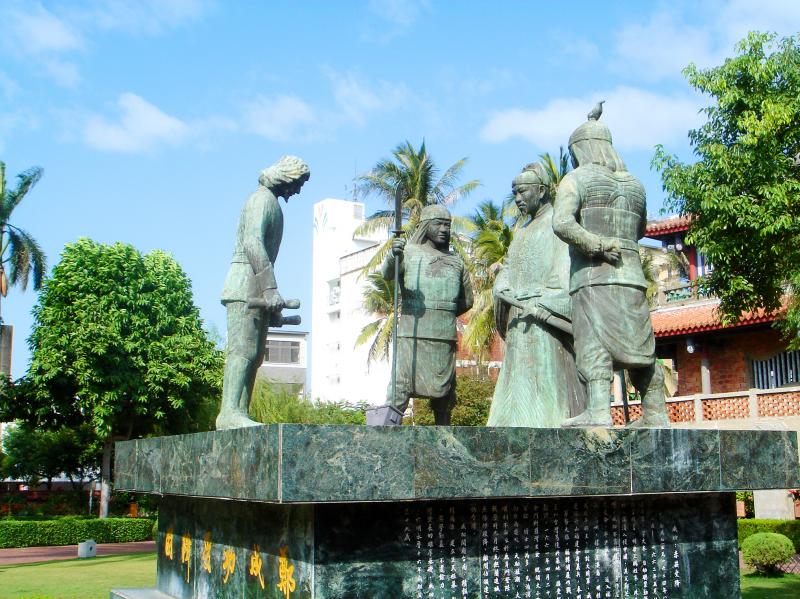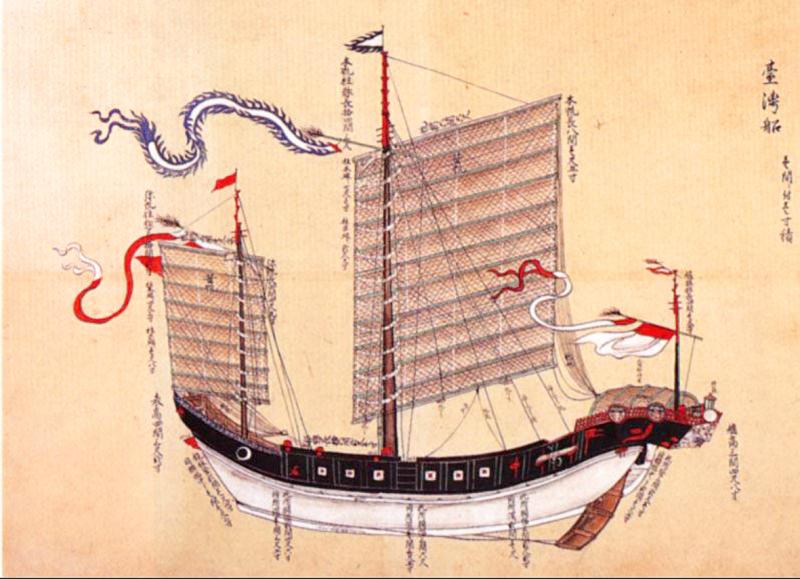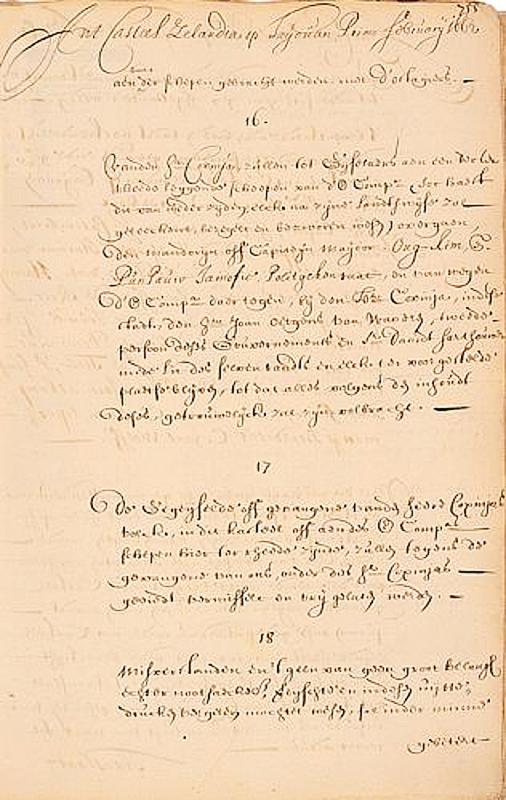Jan. 25 to Jan. 30
It was the beginning of the end when German sergeant Hans Jurgen Radis walked out of the Dutch-controlled Fort Zeelandia and surrendered to the besieging army of Cheng Cheng-kung (鄭成功, also known as Koxinga). The Dutch had already been trapped in the fort for nine months, and they were sick, hungry and in despair.
After one defection during the early days of the siege, Dutch commander Frederick Coyett set up checkpoints around the fort’s perimeter, in what is today’s Tainan. Radis told his bunkmate he was going hunting, but by the time they realized where he was headed, it was too late.

Photos courtesy of Wikimedia Commons
Tonio Andrade writes in How Taiwan Became Chinese that “Radis directed Cheng’s attention to a redoubt located on a hill above Fort Zeelandia. If Cheng could take it, he would be able to shoot directly into the company’s defenses and Zeelandia would be his.”
Cheng began constructing batteries for the operation, and Radis was seen at the fields providing his expertise. The Dutch could do nothing but watch.
On Jan. 25, 1662, Cheng rallied his troops for the final offensive and bombardment. Vastly overpowered, the Dutch blew up the fort and after discussing the matter, decided to surrender, ending their 38-year presence in Taiwan.

Photo courtesy of Wikimedia Commons
UNEASY RELATIONS
Just two decades after the Dutch established their presence in Taiwan in 1624, the Manchu armies had taken the Ming Dynasty capital of Beijing and been pushing southward against remaining Ming loyalists. Cheng was one of those opposed to the Manchus and their subsequent Qing Dynasty, and he camped in his stronghold of Xiamen, directly opposite Taiwan.
Cheng’s relations with the Dutch in Taiwan were cordial at first. Andrade writes that although Cheng would periodically request medical help from the Dutch, there remained deep distrust between the two parties. Some suspected that Cheng was eyeing Taiwan as a base in case he was driven from China. However, the relationship would grow rocky as Cheng began asserting that Taiwan’s Han inhabitants were under his jurisdiction, and blockaded trade between China and Taiwan.

Photo courtesy of Wikimedia Commons
A disastrous attempt to take Nanjing in 1659 left Cheng’s “prestige and organization shattered,” Andrade writes. The Qing threatened to execute anyone who dared trade with him, and were able to disrupt his business networks through a defector. Meanwhile, other centers of Ming loyalism were collapsing, allowing the Qing to focus more on Cheng.
Cheng repelled the first Qing offensive on Xiamen, but he needed new options.
Enter Ho Ting-pin (何廷斌, some sources show him as Ho Pin), who was a wily character. He could speak Dutch and was wealthy and well-connected; his brethren described him as a man with a “greedy appetite and “bottomless stomach.” Ho was the go-to guy when the Dutch needed to communicate with Cheng.
However, in 1659, Ho was caught cheating in a tax-farming auction and later discovered to be illegally collecting tolls from Chinese ships leaving Taiwan. The second offense was serious because it led to diminished trade, as captains were unwilling to pay. Furthermore, the Dutch found that the money was being funnelled to Cheng. Ho fled to Xiamen with his family, leaving a huge amount of debt in Taiwan.
But most importantly, he gave Cheng a map of Taiwan and told him of its riches. Two years later, Cheng announced that Taiwan was a “vast fertile land with revenues of several hundred thousand taels per year.”
“If we concentrate our skilled people there we could easily build ships and make weapons. Of late it has been occupied by the red-haired barbarians, but they have less than a thousand people in their fortress. We could capture it without lifting a hand. I want to conquer Taiwan and use it as a base.”
ASSAULT ON ZEELANDIA
In Taiwan, rumors had swirled of Cheng’s imminent invasion for over a year. On April 30, 1661, the Dutch spotted Cheng’s fleet heading toward them, while Taiwan’s Han inhabitants rushed to help the troops disembark.
The Dutch attempted to slow Cheng’s landing, hoping for the same success they enjoyed when they routed the much larger Kuo Huai-yi (郭懷一) rebels in 1652. But these weren’t angry peasants: they were battle-hardened soldiers.
Cheng’s army quickly took Fort Provintia, and for the next few days Aboriginal chiefs from the area came and pledged their allegiance. The Dutch could do nothing but hold out in Fort Zeelandia, which had powerful walls that withstood Cheng’s cannons.
The siege went on for months, and when 700 soldiers arrived from Batavia to relieve the Dutch, Cheng turned his anger toward Ho, who had told him that the battle would be easy and food was plentiful in Taiwan. In reality, there was barely anything to eat, and Cheng’s men had to find land to farm, which led to countless clashes with Aborigines. Ho “was stripped of his honors” and sent to “live in a small thatched hut, with orders to never show his face again,” Andrade writes. Cheng’s men routed the reinforcements, and the situation in the fortress became increasingly desperate, as the Dutch tried to unsuccessfully ally with the Qing.
Initially Cheng was not planning to launch a final attack until the spring of 1662, but heard that the Dutch had successfully contacted the Qing and formed an alliance. Whether this was true or not, Cheng felt that he had to act immediately.
Radis appeared at just the right time. While Coyett squarely blames the fall of Fort Zeelandia on the defector, some argue that the experienced Cheng had already known about the redoubt.
Nevertheless, Radis’s familiarity with the fort and advanced artillery knowledge did play a part, as it was his European-style battery that proved to be the most devastating during the bombardment. The Dutch discussed holding out and waiting for reinforcements, but ultimately walked out holding a white flag.
Taiwan in Time, a column about Taiwan’s history that is published every Sunday, spotlights important or interesting events around the nation that either have anniversaries this week or are tied to current events.

Taiwan has next to no political engagement in Myanmar, either with the ruling military junta nor the dozens of armed groups who’ve in the last five years taken over around two-thirds of the nation’s territory in a sprawling, patchwork civil war. But early last month, the leader of one relatively minor Burmese revolutionary faction, General Nerdah Bomya, who is also an alleged war criminal, made a low key visit to Taipei, where he met with a member of President William Lai’s (賴清德) staff, a retired Taiwanese military official and several academics. “I feel like Taiwan is a good example of

March 2 to March 8 Gunfire rang out along the shore of the frontline island of Lieyu (烈嶼) on a foggy afternoon on March 7, 1987. By the time it was over, about 20 unarmed Vietnamese refugees — men, women, elderly and children — were dead. They were hastily buried, followed by decades of silence. Months later, opposition politicians and journalists tried to uncover what had happened, but conflicting accounts only deepened the confusion. One version suggested that government troops had mistakenly killed their own operatives attempting to return home from Vietnam. The military maintained that the

Jacques Poissant’s suffering stopped the day he asked his daughter if it would be “cowardly to ask to be helped to die.” The retired Canadian insurance adviser was 93, and “was wasting away” after a long battle with prostate cancer. “He no longer had any zest for life,” Josee Poissant said. Last year her mother made the same choice at 96 when she realized she would not be getting out of hospital. She died surrounded by her children and their partners listening to the music she loved. “She was at peace. She sang until she went to sleep.” Josee Poissant remembers it as a beautiful

Before the last section of the round-the-island railway was electrified, one old blue train still chugged back and forth between Pingtung County’s Fangliao (枋寮) and Taitung (台東) stations once a day. It was so slow, was so hot (it had no air conditioning) and covered such a short distance, that the low fare still failed to attract many riders. This relic of the past was finally retired when the South Link Line was fully electrified on Dec. 23, 2020. A wave of nostalgia surrounded the termination of the Ordinary Train service, as these train carriages had been in use for decades